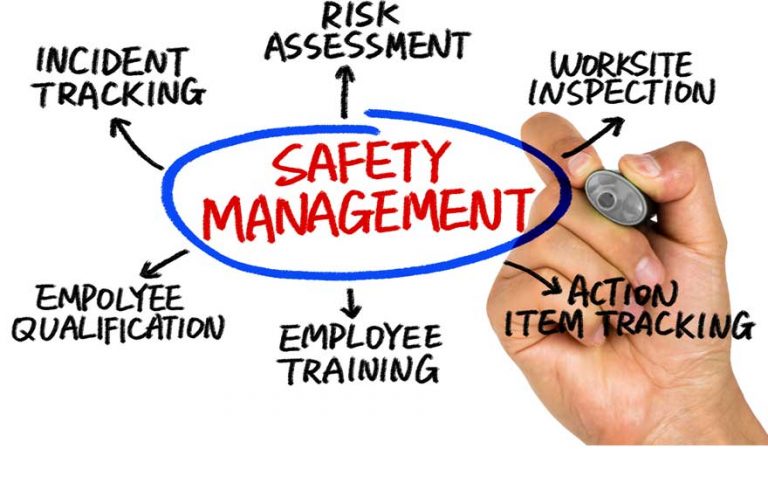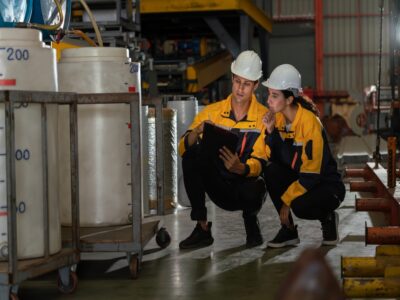
Process Safety Management (PSM) sets the framework for preventing fires, explosions, and the release of hazardous chemicals that could pose a hazard to workers, the general public, and the environment. It is a key part of the whole process safety discipline, pulling all strands together into an integrated whole.
Process Safety Management (PSM) is considered to be so important that special legislation is in place in many jurisdictions of the world for companies that handle highly hazardous chemicals. However, PSM principles can apply equally to all manufacturing and processing businesses, whatever materials they handle. In the US, the OSHA 1910.119 rule applies whereas in Europe it is the SEVESO Directive that provides the basis for national legislations. A number of the world’s industry associations also help encourage compliance by providing guidance on Process Safety Management – such as the Center for Chemical Process Safety (CCPS) in North America.
The Elements of a Process Safety Management (PSM) Program
OSHA 29 CFR 1910.119 sets out 14 elements that sets out the scope of a process safety management:
- Obtaining Process Safety Information
- Process Hazard Analysis
- Operating Procedures
- Provision of training
- Employee participation and engagement
- Pre-start-up safety review
- Mechanical Integrity programs
- Hot Work provision
- Managing change
- Investigation of incidents
- Working with contractors
- Emergency planning and Response
- Conducting compliance Audits
- Dealing with trade secrets
How we can help
Stonehouse process safety specialists have decades of experience assisting companies large and small with their Process Safety Management programs. Here are examples of 10 ways that we can help your organization with your Process Safety Management (PSM) program:
- Development of a PSM system or PSM Gap Analysis
We can help you establish PSM programs in compliance with the Occupational Safety and Health Standard (OSHA 29 CFR 1910.119), Process Safety Management of Highly Hazardous Chemicals, EPA’s Risk Management Rule (40 CFR Part 68), Chemical Accident Prevention Provisions, the New Jersey Toxic Catastrophe Prevention Act (NJTCPA), or your own corporate process safety standards and programs.We also can undertake gap analysis work to evaluate compliance with the above-mentioned rules and guidance. Our PSM audits typically involve working closely with our clients on information collection, then an on-site audit, followed by a written report containing our observations and findings, checklists, and suggestions for correcting any gaps in compliance with the legal requirements as well as best industry safety practices. - Facility siting studies
Building a new plant or extending/ modifying facilities: We can assist and provide expert guidance with facility siting studies in anticipation of application to authorities. Our consultants would utilize the CCPS publication “Guidelines for Facility Siting and Layout” as the basis for recommendations. - Process Hazard Analysis (PHA)
We can undertake or assist you with Process Hazard Analysis (PHA) – for example using techniques such as HAZOP (Hazard and Operability Study), What-If, FMEA (Failure Mode and Effects Analysis), Fault Tree Analysis… - Training/ Competency Development
If you want to develop internal expertise to bring preparation or control of your own PSM program in-house we can provide a tailored PSM competency development program for employees at all levels. - Process Safety Information
We can assist with compiling and/ or checking adequacy of Process Safety Information. We have extensive data available to us but additionally have our own laboratory testing capabilities, to measure flammability and reactivity hazards of the materials you process. - Incident Investigation
An important feature of PSM is to learn from past incidents. We can deploy the expertise of our process safety specialists to undertake investigation of fire, explosion and reactivity incidents at your facility. See our incident investigation page for more details. - Expert input and assessment
To prepare and verify your safety case, our specialist consultants can undertake assessment of technical hazard-control measures, including the evaluation of the safety features in the design and control of processes. - Evaluation of Emergency Plans
We can work with you to evaluate credible loss fire/ explosion/ loss of containment scenarios and help prepare or evaluate best emergency plans and practices. - Building code and fire code hazardous materials reviews.
We can assess compliance with pertinent Codes and Standards, such as the International Building and Fire Codes and many Guides and Recommended Practices of the National Fire Protection Association (NFPA) and the American Petroleum Institute (API). - Litigation Support/ Expert Witness
Our specialists can bring an extra dimension to support your organization with litigation. See our Expert Witness web section for more information on this specialist topic.
Why Stonehouse?
You can count on the proven experience of our consultants in finding optimum solutions to your process safety challenges efficiently and cost effectively.
- Our process safety management consultants come from industry, consulting, and academia
- They have in-depth expertise of process safety engineering and management
- They can provide pertinent, practical, and cost-effective recommendations for process-safety improvements, where warranted
- Our experience spans hundreds of projects globally
- We are expert in identifying and solving process safety challenges
- We are dedicated to making your company safer

Get in touch
To learn more about our expertise and services in dust explosion prevention & mitigation, call us at +1 609 455 0001 or email us at [email protected] today.
We also offer tailored virtual and in-company process safety training programs on Dust Explosions, Static Electricity and HAC (Hazardous Area Classification) and more. Find further information here.










